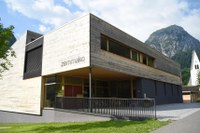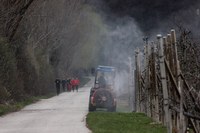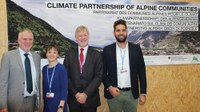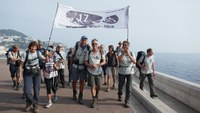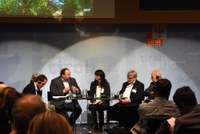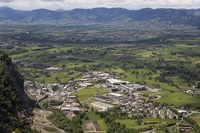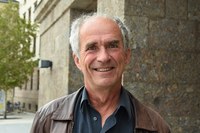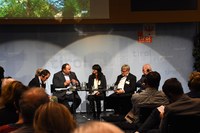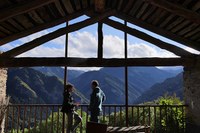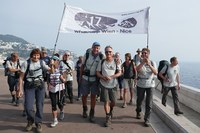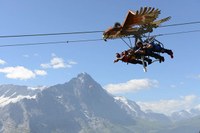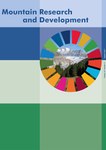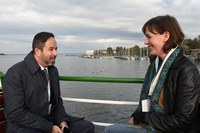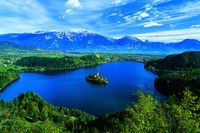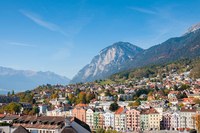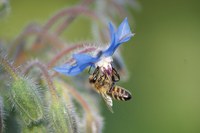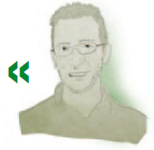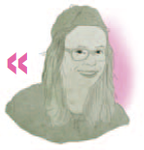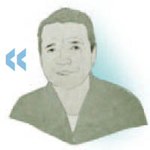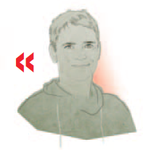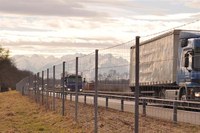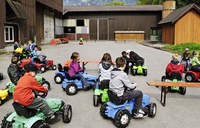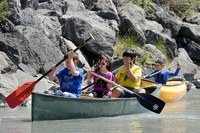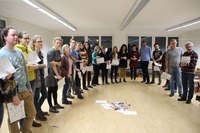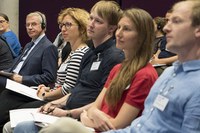Articles
Awards for attractive, well-built constructions
At the end of October 2017 in Bern, Switzerland, Constructive Alps crowned the winning projects, demonstrating that Alpine architecture can not only be pleasing on the eye, but sustainable too. Read More…
Poisoned playgrounds
A study proves the presence of pesticides on children's playgrounds in South Tyrol. The provincial government has taken up a defensive posture. Read More…
Partnership of Alpine communities for climate protection
CIPRA International presented the idea of a Climate Partnership of Alpine Communities at the opening day of the 2017 World Climate Summit in Bonn, Germany. In partnership with the “Alliance in the Alps” and “Alpine Town of the Year” networks, as well as the support of the German Federal Ministry of the Environment, CIPRA International wants to actively strengthen the role of towns and cities in the Alpine region in increasing climate protection in the coming years. Read More…
Alpine crossing “whatsalp” successfully completed
Starting 3rd of June 2017, a group of Alpine experts were hiking through Austria, Switzerland, France and Italy from Vienna to Nice in the course of the project “whatsalp”. They documented the current state of the Alps and exchanged experiences with different people on-site and on the way. Another objective was to draw a comparison with the results of the "TransALPedes”crossing of the Alps in 1992 and to take a look into the future. The main partners of the project were the International Commission for the Protection of the Alps (CIPRA) and the Swiss Alpine Initiative, in addition to numerous other partners such as the Alpine Convention, for instance. On the 29th of September 2017, the whatsalp group arrived in Nice and reported on the results. Read More…
Society’s demands mark the landscape
Conflicting needs and exaggerated expectations collide when it comes to spatial planning. Its role needs to be rethought, with a move away from overall planning and a shift towards guidance and awareness-raising. This was the tenor of the CIPRA Annual Conference held on 29 and 30 September 2017 in Innsbruck, Austria. Read More…
Underestimated soil
We cannot breathe it, we cannot drink it, and yet it forms the very basis of our lives: soil feeds us, is home to us, protects us. Why has its importance hardly been recognised until today? Read More…
Point of view: Municipalities as drivers for sustainable development
Sustainable development cannot be prescribed by law: it needs local people to put it into effect. Municipalities have a key role here, says Jean Horgues-Debat, the newly elected President of CIPRA France. Read More…
Society’s demands mark the landscape
Conflicting needs and exaggerated expectations collide when it comes to spatial planning. Its role needs to be rethought, with a move away from overall planning and a shift towards guidance and awareness-raising. This was the tenor of the CIPRA Annual Conference held on 29 and 30 September 2017 in Innsbruck, Austria. Read More…
I-LivAlps: a conclusion for the future
September saw the fourth and final I-LivAlps workshop on social innovation held in the Valle Maira, Italy. The end of the project has produced a rich harvest. Read More…
Reaching a conclusion: whatsalp arrives in Nice
After five countries, 568 hours of walking and 66,000 metres of altitude, on 29 September 2017 the “whatsalp” group arrived in Nice after a three-month trek through the Alps. The group’s conclusions were critical in nature. Read More…
Oh...
Funfair up on the mountain Read More…
Mountain Research and Development, Vol 37, No 3: Mountain Forests and the SDGs
This Focus Issue assesses the role of mountain forests in relation to the UN Sustainable Development Goals. After an Introductory Essay, papers cover gender issues in agroforestry (Ethiopia) and community forests (Nepal), small-scale mountain farm forestry (Austria), rubber and the rural economy (China), a throughfall-exclusion experiment (Bhutan), mountain forest resilience (India), Andean forest landscape research, US federal forest productivity, rangeland property rights (Bhutan), and urban spatial growth modelling (China). Read More…
Where ideas make waves
CIPRA is a small organisation with a large network. It enables people to tackle challenges together and learn from one another – like Sandrine Percheval and Cassiano Luminati, who met for the first time at the AlpWeek in Grassau/D. Read More…
Going further, together
There is an African saying that goes: “If you want to go quickly, go alone. If you want to go far, go with others.” And the trail to sustainable development in the Alps and to preserving the alpine natural environment, its habitat and its economic area is a very long one indeed. It is one the Alliance in the Alps network of municipalities and CIPRA International have been trekking along together since 1997. Read More…
A blessing and a curse
Some places are deserted, others are overrun by tourists. The two Slovenian municipalities of Bled and Bohinj in the Triglav National Park were faced with the latter situation, as they struggled with masses of cars this summer. Read More…
A pioneering region for a carbon-neutral economy and life
The economy of the Alps is to become greener. To make sure it takes on this colour, the comprehensive action programme “Greening the Economy in the Alpine Region” has been launched. Read More…
Salvation for the bees?
The European Commission is discussing the use of neonicotinoids. The damage caused by these insecticides also strongly affects bees. Read More…
Rivers connect people
The partners of the Spare Project are as diverse as they are at home in different Alpine countries, comprising as they do a university, two research agencies, two official bodies, a regional office, and two environmental organisations. Together they demonstrate how river management can be improved above and beyond administrative, cultural and technical boundaries. Read More…
A wind of change for municipalities
At the Nagelfluhkette Nature Park/A, young people are teaching primary schoolchildren for a day. Together, they study water courses as a habitat for plants and animals. In l’Argentière-la-Bessée/F, another group is creating an adventure trail to the entrance of a silver mine. Read More…
Space is finite
In 2016 CIPRA examined spatial planning from various perspectives. With the alpMonitor project for instance, it demonstrated under the Spatial Planning rubric how such processes can be tackled at the municipal level and what the potential stumbling blocks might be. Read More…
Awakening and change
“Us first” was the pervasive motto in 2016, more so than ever before. In the light of a global political and social climate of isolation it is all the more important for CIPRA to stand up for values such as solidarity, co-operation, environmental protection, and justice. Read More…
Turning risks into opportunities
On this October afternoon in the Swiss region of Surselva, the hotel in Vals is a hive of activity as a group of people discuss and gesticulate in German and Romansh. They’re engaged in an exchange of views on the opportunities, risks, and future of the valley in the wake of climate change. Read More…
Mobility as a state of mind
“People very quickly forget about a traffic jam providing it doesn’t lasts longer than ten minutes.” 140 pairs of eyes were focused on the speaker Gerhard Fehr. At the international symposium on commuter mobility in Hard, Austria, in mid-November, Mr Fehr, a behavioural economist, was showing his audience why the choice of means of transport is often not a rational decision. Read More…
Together against transit traffic
CIPRA Italy. While most of Italy is surrounded by the Mediterranean, to the north the country is encircled by a wide arc formed by the Alps. Goods shipped to Italy via sea routes are distributed onwards throughout Europe from Italy, with European products shipped out through Italian ports. Read More…
Laughing, walking and learning from each other
CIPRA Slovenia. Increasingly, children are now being driven to school by their parents. CIPRA Slovenia is working to counter that trend by working with the Institute for Spatial Policies and the Association for Sustainable Development. And thanks to the Pedibus, schoolchildren get to exercise – and have more opportunities for contact with children of the same age. Read More…
The Alpine Rhine fête
CIPRA Liechtenstein. Taming Europe’s biggest torrent began some two hundred years ago. Today, the Alpine Rhine is a canal, its course lined for the most part by intensively used farmland and residual pockets of wetland forest. Read More…
Think globally, act locally
CIPRA France. The European Strategy for the Alps (Eusalp) examines answers to challenges such as demographic change, economic globalisation, climate change, and energy transition. Read More…
Creating and testing new ways
Climate change, scarce resources, development pressures: there is a global need for new ways and forms of social and economic cohabitation. The Alps too are the setting for social innovations. Read More…
A beacon for sustainable tourism
The second weekend in August will once again see the “Fire across the Alps” burning. In this, the UN Year of Sustainable Tourism for Development, these watch-fires are intended to stimulate ideas as to the necessary changes for tourism in the Alps. Read More…
Give youth a voice! How youth participation can be encouraged in the Alpine space
How can young people become more involved in political processes? What good examples already exist for this? These questions were the central issues at a workshop held in the context of the GaYA project in Bozen/Bolzano. Read More…
